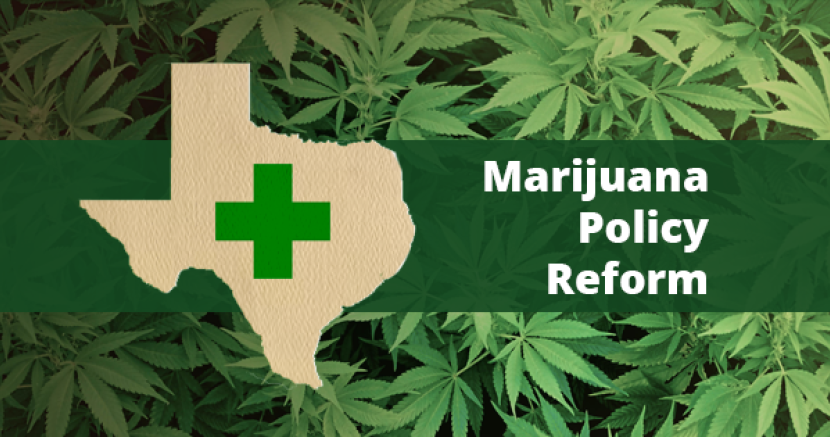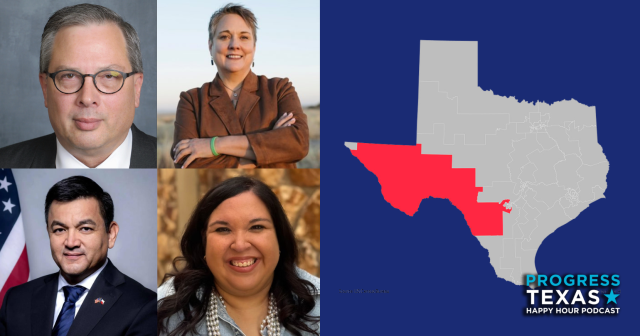Ed. note: this post was originally published on February 9, 2015. It has been updated throughout to reflect new bills filed.
As we previously wrote, polls show a majority of Texans support marijuana policy reform - and so far this session, legislators are filing bills to make that happen.
There is currently an active effort to encourage our legislators to broaden their understanding of marijuana in Texas. That effort includes proposed legislation ranging from bills to reduce criminal penalties for possessing small amounts, to various medical marijuana bills to provide relief for those suffering from illness.
While more bills are expected to be filed, here are the current bills we are keeping our eye on:
Ticket Instead of Jail for Small Possession
Reducing marijuana penalties to a ticket and a fine, also known as changing the law from a criminal penalty to a civil penalty, will help eliminate the criminal culture of small amounts of marijuana possession. These laws can help reduce the burden on our legal system by up to 70,000 arrests for mere possession of small amounts of marijuana. These are the three bills we are looking at:
Rep. Joe Moody’s (Democrat) Bill - HB 507
- The most effective civil penalties bill filed
- Changes possession of less than one ounce of marijuana to a civil penalty – similar to jaywalking or not wearing a seat belt
- Anything over one ounce of marijuana remains a class B misdemeanor
Rep. Harold Dutton’s (Democrat) Bill - HB 414
- Would change any marijuana possession less than one ounce to a Class C Misdemeanor
- Makes possession a simple ticketable offense you could pay
- Punishments increase if ticketed multiple times in a year
Rep. Gene Wu’s (Democrat) Bill - HB 325
- Possession of less than .35 ounces of marijuana becomes a Class C Misdemeanor
- Makes possession a simple ticketable offense you could pay
- Punishments increase if ticketed multiple times in a year
Rep. Senfronia Thompson’s (Democrat) Bill – HB 1115
- Rather than potentially being arrested when carrying up to four ounces of marijuana an officer will only give a citation; However, the person charged is still responsible for appearing in court at a later date.
- Does not reduce the penalty of marijuana possession (Class A or B misdemeanor), which can still result in jail time.
The main problem with the current marijuana policy is that it treats ordinary Americans who possess small amounts of marijuana the same as it treats cyber terrorists, or people who commit certain levels of assault. The current policy can result in up to $2,000 in fines, up to 180 days of jail time, and a conviction of a Class B Misdemeanor on your record just for the first offense.
Medical Marijuana
While opponents of medical marijuana claim it has no medicinal benefits, the fact of the matter is that marijuana has been proven to treat many ailments ranging from nausea and loss of appetite in cancer patients, to being the most effective form of treatment for some severe seizure disorders. In fact, most groups lobbying against legalization of medical marijuana are large pharmaceutical groups who know it will cut into their profits if marijuana is legalized.
These are the bills that have been filed that would regulate a form of medical marijuana:
Sen. José Menéndez’s (Democrat) Bill – SB 1839
Rep. Marisa Marquez’s (Democrat) Bill – HB 3785
- Implements a full scale medical marijuana system
- Allows for the use of medical marijuana upon the recommendation of a physician for qualifying conditions including Cancer, Glaucoma, HIV/AIDS, Ulcerative Colitis, Crohn’s disease, Alzheimer’s, PTSD, epilepsy, or MS.
- Establishes definitions of medical manufacturing facilities, as well as personal growing allowances
- Establishes requirements for a business to sell medical marijuana
- Allows a patient with another state’s medical card to be used in Texas
- Implements a full scale medical marijuana system
- Companion Bills
Full Analysis of the bill here
Sen. Kevin Eltife’s (Republican) Bill - SB 339
- Legalizes low THC cannabinoids (marijuana that does not produce a “high” typically associated with marijuana), which have shown to be an effective form of treatment for some patients with seizure disorders
- Is not based on any of the existing medical marijuana laws in 23 states
- Does not benefit PTSD sufferers, cancer patients, HIV/AIDS patients, or any other number of ailments that the more comprehensive medical marijuana bills from other states would do
Rep. Elliott Naishtat’s (Democrat) Bill - HB 837
- Does not legalize medical marijuana, but allows for patients (and their caretakers) who have been prescribed marijuana by a physician to use an affirmative defense in court
- Essentially allows them to explain to a judge that the marijuana is for medical use and is therefore not illegal for them
- Still would drag terminally ill patients who need these drugs into court, but would allow them to avoid having to pay for an expensive lawyer
- Does not provide a system for dispensing medical marijuana
Research and Industrialization of Marijuana
Aside from smoking marijuana, there are other uses for the product such as research in medical studies and even biodegradable plastics from hemp. While we would like to see all research of marijuana be allowed, here is what is currently being considered in the legislature:
Rep. Joe Farias’ (Democrat) Bill – HB 557
- Allows for accredited research institutions to grow and investigate potential uses of Hemp for industrial purposes
- Does not provide legalization of research of marijuana for medical use
Full Scale Deregulation
Rep. David Simpson’s (Republican) Bill – HB 2165
Citing Religion as the reason for this departure from the traditional Republican stance on marijuana, Rep. Simpson’s bill removes all mentions of marijuana from Texas’ legal code – essentially making it completely legal. This includes removing mentions of marijuana possession, manufacture, and delivery.
Make sure to follow @ProgressTexas and like our Facebook page for updates on these bills!
DONATE
Your donation supports our media and helps us keep it free of ads and paywalls.









